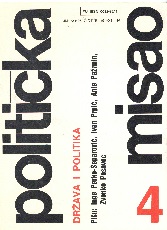Primjer jedne neoliberalne teorije države
An Example of a Neoliberal Theory of the State
Author(s): Davor RodinSubject(s): Political Philosophy, Political Theory, Political Sciences, Hermeneutics
Published by: Fakultet političkih znanosti u Zagrebu
Keywords: Neoliberal; Theory of the State;
Summary/Abstract: A constitutive and therefore inevitable instability is a feature of the state in the modem era. A deep cause of the stability crisis of the European population in the modern era is the rationality which was meant by the theoretical mind to take control over human practice and production. Criticism by Husserl, Lukács, and Heidegger has contributed to the overcoming or at least to an understanding of the instability of bourgeois society. A farewell to the Modern Era begins with a critique of philosophical scientism. Contemporary theories do not establish what the essence of scientific, technical, economic, political, and cultural artifacts is but instead ask themselves against what anthropological state, what existential unease, what communication barrier, or hermeneutic situation does man react in such a way as to produce the contemporary scientific and technical world to which the state also belongs. The hermeneutic situation of the contemporary theories of political action comprises today's mass democracy and the scientific and technical reproduction of living. The application of science, not only in the economy, has created enormous surpluses of science, value, and power. Such a situation requires answers to the question what the modern state, economy, and public opinion indeed are. The real problem of today is that there is no possibility for a competent democratic control over the surpluses of knowledge, value, and power. This is followed by a critique of the political philosophy of the conservative liberal Herman Lübbe whose theoretical starting point is a contingent interpretation of the future — the conservation of those contents of the past that possess a capacity for the future.
Journal: Politička Misao
- Issue Year: XXIV/1987
- Issue No: 04
- Page Range: 107-119
- Page Count: 13
- Language: Croatian

